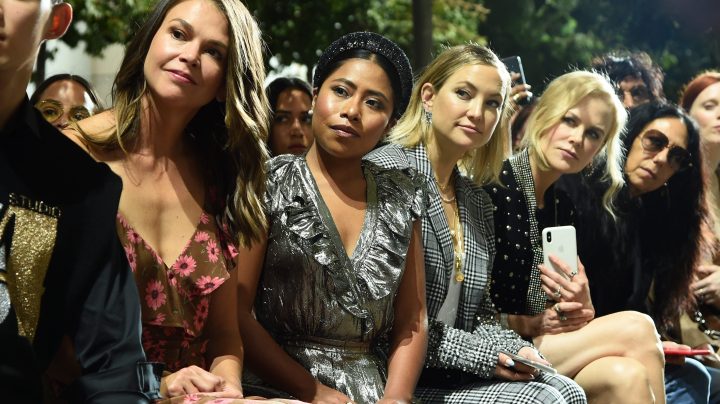Yalitza Aparicio Embraces the Term ‘Prieta,’ Sparks Discussion on the Word’s Meaning

(L-R) Leo Wu, Sutton Foster, Yalitza Aparicio, Kate Hudson, Nicole Kidman, Inez van Lamsweerde, Karen Elson and Derek Blasberg attend the Michael Kors Collection Spring 2020 Runway Show on September 11, 2019 in the Brooklyn borough of New York City. Photo by Dimitrios Kambouris/Getty Images
Ever since making her award-winning debut in the film Roma, actress Yalitza Aparicio has shot to fame in Mexico. Unfortunately, her celebrity status has made her the target of a disappointing amount of racism and bigotry centered around her Indigenous identity and her roots in Mixtec and Triqui communities.
Last month, Aparicio penned a New York Times op-ed in which she sparked a discussion about the discrimination she’s faced firsthand and how she’s powered through it to help boost the voices of people who are disenfranchised in Mexican society. This week, Aparicio tackled racism in Mexico again by sharing a post from the Facebook page “Recuerdos De Mi México” that reclaims the word “prieta.”
“They call me prieta and think it is an insult,” the post reads and continues with a poem linking the word to the beauty in different natural elements. “Prieta, like the fertile soil under my bare feet. Prieta, like the night. Prieta, the bronze race.” Different people have tagged friends to encourage its spread; Narcos: Mexico actor Tenoch Huerta was tagged by a Twitter user before Aparicio retweeted it.
“That’s right,” Aparicio wrote, adding, “I share this text for those who use this word offensively.”

But the word has different connotations, depending on what country it’s used in. In Mexico, it’s a derogatory term for Brown or darker-skinned people, often used by Mexicans who appear white. Some people, as the comments in the original “Recuerdos De Mi México” Facebook page show, are hell-bent on insisting that the term can be used without being offensive.
However, in many other regions, particularly in Central America and the Caribbean, “prieto” is used, also with derogatory undertones, for people who are Black. As much as Aparicio’s reclamation of the word is intended as a celebration, it might not make sense to some communities and could even be seen as a word that a non-Black person shouldn’t be claiming. Still, the conversation encompasses broader questions about the meaning of the word, colorism, and the nuances of language in different parts of Latin America.